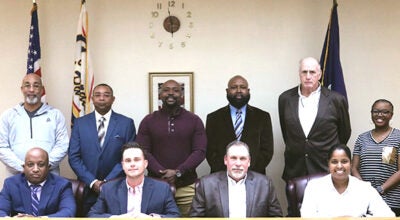Community leaders seek to further Natchez cultural tourism
Published 12:53 am Sunday, February 19, 2017
NATCHEZ — With a growing shift toward tourism focused on cultural experiences — particularly the American Civil Rights Movement and black history — local tourism leaders are exploring how to further develop a diverse, inclusive narrative as a foundation for Natchez tourism.
Many strides have been made throughout the years in establishing black history as a part of Natchez tourism, with the creation of the Natchez Museum of African-American History and Culture, efforts to develop the Forks of the Road, site of the second-largest slave market in the South, the development of the William Johnson House by the National Park Service, the Rhythm Night Club and others.
Throughout the yearlong Natchez Tricentennial celebration in 2016, a concerted effort was made by the Tricentennial Commission to commemorate all aspects and people of Natchez history, said Tourism Director Jennifer Ogden Combs, who also served as director of the tricentennial.
On the heels of the changes in the city’s tourism leadership and the conclusion of the tricentennial celebration, Natchez tourism is at a crossroads, Combs said.
Moving forward, Combs said, telling “the whole story of Natchez and making it accessible” to residents and visitors will be a top priority of the city’s tourism operations.
Tourism in Natchez has been criticized in the past for not focusing enough on black history as well as the history of other ethnic groups who have history in the area.
“It is non-negotiable to me that everybody has a seat at the table,” Combs said. “That is really important to me, and is, frankly, what interests me in getting involved in Natchez tourism and going forward.”
To ensure that everyone has a seat at the table, Combs said, work needs to be done on developing tools to equip those who are interested in creating tourism experiences related to black history and the history of other ethnic groups in the city.
“We need the Jeremy Houstons that see something that’s missing and step up to make it happen,” Combs said.
Houston is a young, black Natchez native who says after moving back to Natchez in 2012, he saw a need to develop tours that focused on the city’s black history. Houston and his business partners recently began Miss-Lou Heritage Group and Tours.
Houston said a need exists to implement a “Natchez equal history commemoration campaign.
“With the accomplishments of African-Americans in this city, tourism is important because we as black people can tell our story (from the) perspective of a black person during those times. You would be disrespecting the accomplishments of Natchez in this city if you don’t mention the impact and history of African-Americans.”
Historic Natchez Foundation Executive Director Mimi Miller said she would like to see the community create more tourism-related entrepreneur opportunities for African-Americans.
“Jeremy is a good example with his African-American tours,” she said. “I think we could give incentives and encouragement to African-American entrepreneurs to give them tools for starting businesses that benefit tourism.”
In addition to honoring the contributions of African-Americans and other minorities in a way that reflects their significance, a more complete and holistic approach to tourism is more likely to attract visitors, Miller said.
“I think we need to make sure we realize that it shouldn’t be black tourism and white tourism,” Miller said. “I don’t think we need to tell our history in isolated ways. We need to think of it as shared history. Immediately what comes to mind is white and black, but it will include other ethnic groups that are a part of our past, too, like the role of Jews, Italians, Native Americans and others.
“I think that means people can come here and have different types of experiences, and we’re not just marketing one kind. If we try to create a holistic experience, I think we are more likely to capture more visitors.”
Today’s visitor traveling for a cultural tourism is looking for an authentic experience, Natchez National Historical Park Superintendent Kathleen Bond said.
“They are looking for something grounded in reality that helps them understand the world,” she said. “I think in particular, people who are international visitors and people on the Blues Trail are particularly interested in what helps them understand race in America.”
Bond said Natchez has made some good beginnings for cultural tourism in Natchez.
“In a way, tourism in Natchez is still … in its infancy,” Bond said. “It feels a little like baby steps, and it’s important the baby keeps growing, and we keep encouraging it to be stronger and go in the right direction.”
Moving tourism forward and in the right direction will take a united effort by the community, Bond said.
“One of the things I would personally like to see is us engaging more of the town’s young people to figure out what our stories are,” she said. “As we figure out what are stories are, I think we engage young people to figure out how we tell those stories.”
By involving youth in the development of Natchez’s story and tourism offerings, Bond said, it opens many doors for more involvement in educating young people about their history beyond merely for tourism purposes.
That knowledge will equip young people — particularly young black people — with an understanding of the struggles and triumphs of their ancestors, and empower them to navigate the present and create their future, says Darrell White, director of the Natchez Museum of African-American History and Culture.
Today’s political climate, White said, has seen the emergence of groups like the so-called alt-right. Many of those voices, White said, are a return to or an iteration of ideals of those who fought against the Civil Rights Movement.
Developing educational tools to teach local residents and visitors alike about the Civil Rights Movement and black history can help them to recognize racism and bigotry now and learn about how to fight against it, White said.
“What we are beginning to see is a return to some of the mindsets that existed 50 years ago, and folks need to be aware that what they are seeing today, in some instances, is just a continuation of that,” White said. “They need to be aware of the history so they can recognize it.”
Beyond creating tourism experiences to attract visitors, developing black history sites and stories provides opportunities for learning — and even healing — within the community, White said.
In late 2015, a reunion of those who endured what is known as the Parchman Ordeal was organized in Natchez. The goal was to shine a light on the story of the hundreds of black Natchezians who were arrested in October 1965, placed on buses and shipped against their will to the state penitentiary in Parchman where they endured humiliation and abuse.
“Recognizing what happened to those people at Parchman has resulted in a marker that is to be dedicated to them and has also helped healing within the community,” White said.
That sequence of events is an example, White said, of how an event like Parchman can be respectfully commemorated, encourage healing and developed into a Civil Rights site that can serve as an education experience for local residents and tourists.
“It helps no one to ignore them and not accept the fact that they occurred and people were damaged and the community is still recovering,” White said. “The aftermath is still present.
“You have to know where you’ve been so you can figure out exactly where you are and where to go from here.”







